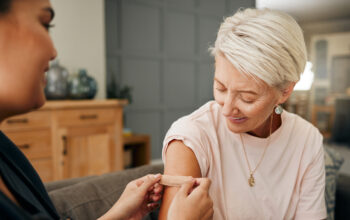Innovation and equity: at the core of future pandemic responses

In this year’s edition of Health: A Political Choice – From Fragmentation to Integration, Thomas Cueni focuses on the lessons learned from COVID-19.
When the next pandemic hits, the success of our response will depend on how well we react to the lessons learned from Covid-19. The world was ill prepared for the pandemic, costing millions of lives and trillions of dollars in economic loss. Yet, the political interest in pandemic prevention, preparedness and response is already fading.
This presents a clear challenge to the global health community in being heard. But it also makes it even more important that we continue to listen, collaborate and learn about how we can take the shared lessons from Covid-19 and build consensus about what needs to be put in place to strengthen our collective response to the next pandemic.
As discussions continue at the World Health Organization on a new pandemic accord, there are two central objectives that we must align around: how we support innovation and how we deliver equity of access.
The innovation lesson
In response to Covid-19, science and innovation delivered. The development of a Covid-19 vaccine was the fastest on record — approved just 326 days after the viral genome sequence of SARS-CoV-2 was published in January 2020. Within a year of approval, more than 11 billion doses of vaccines were delivered. It is estimated that in the first year alone, Covid-19 vaccinations saved 20 million lives.
This was the result of a robust innovation ecosystem that we have put in place over many decades, which has helped drive global health progress and which gave us the strong foundation to respond to Covid-19. The most powerful example of this was the development of mRNA vaccines. mRNA research was for a long time marked by more hope, trials and disappointments than results. Risky investments in mRNA research to treat cancer meant that although never tried before for vaccines, the technology was ready to be put to the test for tackling Covid-19. It is because of this innovation ecosystem that companies such as Moderna and BioNTech were able to make the case for primarily private investments to push forward the science of mRNA technology, burning money for almost two decades, hoping for a breakthrough. It turned out to be a game-changer, enabling the vaccination of people against Covid-19.
But while the attention is mostly on the successful vaccines, few people are aware that of the 23 mRNA vaccine candidates, only two made it to the finish line. And out of the more than 300 vaccine candidates, less than 5% were successful. Furthermore, more than half of Covid-19 treatments were developed building on research on products previously approved for other indications, meaning companies explored their library of compounds to see which could work against Covid-19. These treatments would have taken more time to develop without the decades of investment in how to tackle other diseases.
Effective vaccines and treatments will again be central to our response to the next pandemic. Recent research by the independent disease forecasting company, Airfinity, estimates that if effective vaccines are rolled out 100 days after the discovery of a new pathogen, the likelihood of a pandemic as deadly as Covid-19 taking place in the next decade drops from 27.5% to 8.1%. That is why it is so concerning that right now, there is a real risk that we inadvertently undermine this ecosystem.
An example of this is the debate over the sharing of pathogens and their genetic information. Rapid, unhindered access to this information was never questioned in the fight against Covid-19. As soon as the sequence of the novel coronavirus and subsequent variants were published online, scientists were able to access this information in real time and start to work on the development of the medical countermeasures. This will be critical against future pandemics. Any move to slow the spread of information through transactional access barriers to pathogens or genetic information must be avoided, if we want to have a chance for an even faster response as set out in the 100 Days Mission.
Another example is the protection of intellectual property, not only critical to incentivise research and innovation, but also critical to facilitate the voluntary partnerships between companies and organisations, which we saw on an unprecedented scale during Covid-19. More than 450 voluntary collaborations were in place to support the scale-up of production of Covid-19 vaccines and treatments. These partnerships went far beyond granting licences, but included knowhow sharing, technology transfer and training of people. By partnering with the companies that have the right expertise and experience alongside a proven track record of quality and safety, it was possible to treble global vaccine production and supply. Such partnerships are based on trust and cannot be coerced. Efforts to introduce compulsory licensing or other measures would fail to deliver the reliable scale up of supply needed.
The equity lesson
However, while we saw the triumph of science and record scaling up of vaccines and treatments, there is no denying that when it came to ensuring equity of access to Covid-19 vaccines and treatments, the global healthcare community fell short of its promise to leave no one behind. Although we saw a strong start to equitable rollout through the establishment of COVAX, this was soon undercut by vaccine nationalism and export bans, which, in particular, left people in Africa behind for far too long. We must do better in response to future pandemics.
Last year, the pharmaceutical industry published its own plans to address the failure of equitable access during the Covid-19 pandemic in the Berlin Declaration, with a commitment that companies reserve an allocation of real-time production of vaccines, treatments and diagnostics for priority populations in lower-income countries. These commitments were also embraced by the Developing Countries Vaccines Manufacturing Network and the Biotechnology Industry Organization. But for this to work, we must see coordinated action by industry, governments and multilateral organisations.
First, we need a social contract. Governments in countries where manufacturing facilities are located need to commit to facilitating the export or import of raw materials and finished products. Trade restrictions and tariffs hamper efforts for equitable rollout. We must see countries make meaningful commitments in this regard.
Second, Covid-19 also highlighted that resilient production capacity, geographical diversification of manufacturing, sustainable supply chains and a network of established trusted partners are a key part of preparations for future pandemics. But this will not happen overnight. We need to understand future demand, create the right environment that attracts sustainable investments, ensure we have a highly skilled workforce, and strengthen regulatory capacities and supply chains.
The ability for us to learn the right lessons from the Covid-19 pandemic will determine our ability to respond to the next. We must take an evidence-based approach and look to build consensus on the measures that both preserve the innovation ecosystem that will deliver vaccines and treatments, alongside practical proposals that will ensure they reach the people who need them. These must be the guiding principles of our plans.
The full edition can be accessed here.
Author






